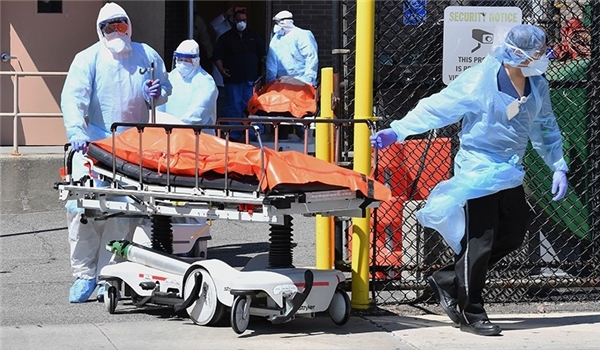UK Analysis: More People Dying at Home During COVID-19 Pandemic

About 8,000 more people have died in their own homes since the start of the coronavirus pandemic than in normal times, an analysis found, as concerns grow over the number avoiding going to hospital.
Of that total, 80% died of conditions unrelated to COVID-19, according to their death certificates. Doctors’ leaders have warned that fears and deprioritisation of non-coronavirus patients are taking a deadly toll, The Guardian reported.
The data shows 8,196 more deaths at home in England, Wales and Scotland compared with the five-year average for this time of year, including 6,546 non-COVID deaths. It also indicates a drop in non-COVID deaths in hospital, however, leading experts to conclude that many who would ordinarily have been admitted to a ward and died there are instead dying at home.
Jason Oke, a statistician with the Nuffield Department of Primary Care Health Sciences at the University of Oxford, said, “This would mean fewer deaths from other causes in hospitals and more deaths from other causes at home or in care homes. It is of course possible that, in addition to this, COVID-19 is being missed in people who remain outside of hospital.
“A third explanation is that people are dying of other causes that would not have happened under normal conditions – and are collateral damage of the lockdown,” He added that there was no way of knowing for sure based on the available data.
Doctors’ leaders have warned that some sick people are too scared to go to hospital and are aware that much of the usual NHS care had been suspended in the pandemic.
“These figures underline that the devastation wrought by COVID-19 spreads far beyond the immediate effects of the illness itself,” said Dr Chaand Nagpaul, the council chair of the British Medical Association.
“While all parts of the NHS have rallied round in a bid to meet the immediate rocketing demand caused by the pandemic, more than half of doctors in a recent BMA survey have told us that this is worsening the care of non-COVID patients,” Nagpaul added.
He cited a fall in A&E visits of up to 50% and a drop by half of patients attending hospitals with heart attacks.
“Referrals from GPs are not being accepted unless for serious medical conditions and routine investigations to aid diagnosis are not available in many cases. This means many ill patients are not getting the care they so desperately need now – and crucially, risking their conditions getting worse and with some even dying as a result,” Nagpaul added.
Prof Andrew Goddard, president of the Royal College of Physicians, said excess community deaths from non-COVID causes had been seen across Europe. A report this week found that there had been about 11,600 such fatalities in Italy during its pandemic, including deaths from heart attacks and strokes, he added.
“Data from other countries has shown delayed presentation in patients with heart attacks during the pandemic, either because people don’t want to burden the health service at the current time, or because of fear of catching COVID-19. It is critical that patients who are worried they may be having a heart attack or stroke should call 999.”
The fatality figures from the Guardian analysis of the England and Wales data are based on the date of occurrence rather than on the date of registration.
The number of deaths occurring in care homes in England and Wales in the week to 24 April was 3.1 times the toll in the equivalent week over the past five years, while deaths in private homes and in hospitals were up to 1.5 times higher than typically seen in the same week.
Over the course of the past seven weeks, there were 23,583 deaths in people’s homes compared with the five-year average of 16,794. But of the extra 6,789 fatalities, just one in four were attributed to coronavirus, leaving 5,355 excess non-COVID deaths.
Similar data from Scotland – which is based on date of registration rather than date of the death occurring and is more up to date – shows a similar trend. In the seven weeks to May 3, there were 3,453 deaths in private homes and non-institutional settings in Scotland. This compares with 2,046 in a typical year. However, of the remaining deaths, just 216 were COVID-related, leaving 1,191 excess deaths.
Similarly, 32,633 deaths were recorded in care homes in England and Wales, more than twice the figure typically expected at this time of year (15,670). Of the remaining deaths, just 6,815 were COVID-19 deaths, leaving 10,148 deaths where COVID-19 was not mentioned on the death certificate.
While there were 597 excess deaths in Scottish care homes in the seven weeks to May 3, these are lower than the number of coronavirus-related deaths (1,195).
There have been 704 excess deaths in Northern Ireland since the first coronavirus death was registered there. However, Northern Ireland does not currently publish a five-year average of deaths.
Excess deaths grew week on week in both care homes and private homes in England and Wales up until the week ending April 10, but have fallen in the two subsequent weeks for which data is available.
David Leon, professor of epidemiology at the London School of Hygiene & Tropical Medicine, said the significant numbers of non-COVID excess deaths in care homes would be down to several factors, including undiagnosed COVID-19 deaths.
“People who are dying from other conditions in care homes may be less likely to be admitted to hospital than pre-pandemic due to concerns about strain on resources,” he said, adding, “These deaths are ones that would have occurred regardless of the pandemic, but happened in care homes rather than hospitals.
“Finally, there is the concern that some of the deaths in care homes were avoidable – in that some people died because they did not get life-saving treatment in hospitals, because of a reluctance to send them for specialist medical treatment. How big this group is is unclear. It will undoubtedly be the focus of inquiry over the coming months,” he said.







